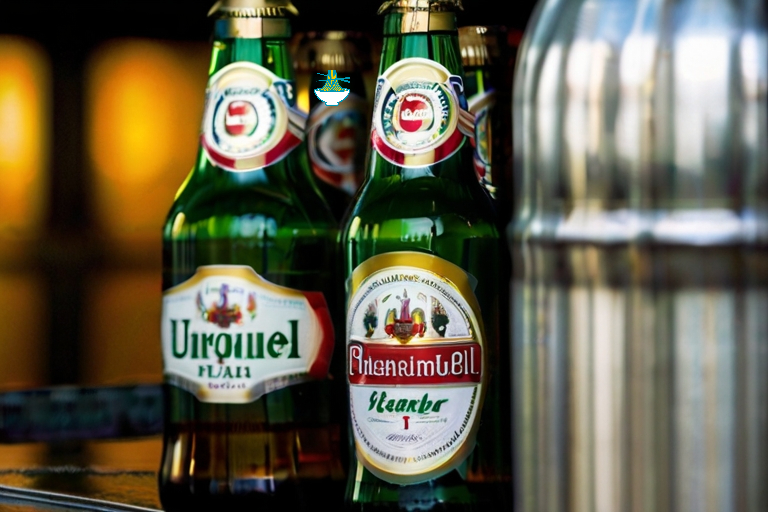Indulge in the timeless craftsmanship of our Bohemian Breeze Czech Pilsner, a quintessential brew that embodies the rich brewing heritage of the Czech Republic. With a radiant golden hue and a delicate, crisp taste, each sip delivers a symphony of noble hops and premium malt, culminating in a refreshing experience that's both satisfying and invigorating. Crafted with precision and passion, our Czech Pilsner is a testament to tradition, offering beer enthusiasts a journey through the heart of Bohemia with every pour. Raise your glass and savor the essence of Czech brewing excellence with Bohemian Breeze.
Here's a simplified recipe for brewing Czech Republic Pilsner beer, inspired by the renowned Pilsner Urquell:
Ingredients:
- 9 lbs (4.1 kg) Pilsner malt
- 1 lb (0.45 kg) Munich malt
- 1 oz (28 g) Saaz hops (bittering, 60 minutes)
- 1 oz (28 g) Saaz hops (aroma, 10 minutes)
- Czech lager yeast (such as Wyeast 2001 or White Labs WLP800)
- Water
- Priming sugar (for bottling)

Instructions:
1- Mashing: In a large pot, heat 3 gallons (11.4 liters) of water to about 165°F (74°C). Add crushed Pilsner and Munich malts to the water, stirring to ensure they are thoroughly mixed. Maintain a temperature of around 150-152°F (66-67°C) for 60-90 minutes to allow enzymatic conversion of starches to sugars.
2- Sparge: After mashing, sparge the grains with hot water (around 170°F/77°C) to extract as much fermentable sugar as possible. Collect the wort in your brew kettle.
3- Boiling: Bring the wort to a boil. Once boiling, add the bittering hops (1 oz of Saaz) and boil for 60 minutes.
4- Aroma hops: About 10 minutes before the end of the boil, add the aroma hops (1 oz of Saaz).
5- Cooling and Fermentation: After boiling, quickly cool the wort to around 50-55°F (10-13°C). Transfer the cooled wort to a sanitized fermentation vessel and pitch the Czech lager yeast. Seal the vessel with an airlock and ferment at a controlled temperature of around 48-52°F (9-11°C) for about 2 weeks, or until fermentation activity ceases.
6- Lagering: After fermentation is complete, transfer the beer to a secondary fermentation vessel or lagering tank. Lager the beer at near-freezing temperatures (around 35-40°F or 2-4°C) for 4-6 weeks to allow flavors to mellow and clarify.
7- Bottling: Once lagering is complete, prime the beer with priming sugar and bottle it. Allow the bottled beer to carbonate at room temperature for about 2 weeks before refrigerating.
8- Enjoy: After carbonation, chill the beer and enjoy the refreshing taste of your homemade Czech Republic Pilsner!
Note: This recipe is a simplified version inspired by the classic Czech Pilsner style. For more advanced brewing techniques or to closely mimic the flavor of Pilsner Urquell, additional steps and ingredients may be required.
Nutritional Values:
Providing precise nutritional values for the ingredients in a beer recipe can be challenging as they can vary based on factors like brewing process, fermentation, and other variables. However, I can offer approximate nutritional information for some common ingredients used in brewing Czech Pilsner beer:
Pilsner Malt (per 1 cup, approx. 118g):
- Calories: 450
- Carbohydrates: 96g
- Protein: 12g
- Fat: 2g
- Fiber: 8g
benefits:
- Provides fermentable sugars necessary for alcohol production during brewing.
- Imparts a light color and mild malt flavor characteristic of Pilsner-style beers.
- Contributes to the body and mouthfeel of the finished beer.
Munich Malt (per 1 cup, approx. 118g):
- Calories: 450
- Carbohydrates: 96g
- Protein: 12g
- Fat: 2g
- Fiber: 8g
benefits:
- Adds depth of flavor and complexity to the beer with its rich, malty sweetness.
- Enhances the malt profile, providing a slightly toasted or biscuity character.
- Improves head retention and overall balance in the final brew.
Saaz Hops (per 1 oz, approx. 28g):
- Calories: 40
- Carbohydrates: 7g
- Protein: 2g
- Fat: 0g
- Fiber: 4g
benefits:
- Imparts a delicate, floral aroma and mild bitterness to the beer.
- Adds a subtle spicy or herbal note that complements the malt profile.
- Contributes to the overall aroma and flavor balance of Czech Pilsner-style beers.
Please note that these values are approximate and can vary depending on the specific brands and processing methods of the ingredients. Additionally, the brewing process itself transforms many of these nutrients, particularly the carbohydrates, into alcohol during fermentation, altering the final nutritional profile of the finished beer.


Comments